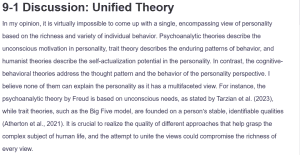9-1 Discussion: Unified Theory
In my opinion, it is virtually impossible to come up with a single, encompassing view of personality based on the richness and variety of individual behavior. Psychoanalytic theories describe the unconscious motivation in personality, trait theory describes the enduring patterns of behavior, and humanist theories describe the self-actualization potential in the personality. In contrast, the cognitive-behavioral theories address the thought pattern and the behavior of the personality perspective. I believe none of them can explain the personality as it has a multifaceted view. For instance, the psychoanalytic theory by Freud is based on unconscious needs, as stated by Tarzian et al. (2023), while trait theories, such as the Big Five model, are founded on a person’s stable, identifiable qualities (Atherton et al., 2021). It is crucial to realize the quality of different approaches that help grasp the complex subject of human life, and the attempt to unite the views could compromise the richness of every view.
Notably, although I am aware that such an integrated model of personality might help elucidate the given topic and improve the efficiency of further research, the possible problems of oversimplification matter much more. It is unreasonable to think that one theory could cover all of these aspects, given that personality is formed by various factors, such as genes, culture, and life events (Na et al., 2019). If all of these are integrated into one framework of analysis, it could be that the benefit of learning from each perspective might be lost since each has its own way of looking at personality and human behavior, which might be more limited if compressed into one model.
Besides, I believe sustaining many theoretical attitudes at a personal level is wiser and more advantageous depending on the context towards which they are being applied. All the theories have their respective roles and can be used in various research problems and genuine situations. For instance, cognitive-behavioral theories are most helpful when applied to therapy, while trait theories come in handy when trying to establish future conduct. That is why, as Thoele et al. (2020) point out, a set of different models would make it possible to consider oneself free and easy to choose. I think the fact that social media research is so diverse is an advantage, and having a single theory would reduce the richness we now tap into.
References
Atherton, O. E., Sutin, A. R., Terracciano, A., & Robins, R. W. (2021). Stability and change in the Big Five personality traits: Findings from a longitudinal study of Mexican-origin adults. Journal of Personality and Social Psychology, 122(2). https://doi.org/10.1037/pspp0000385
Na, J., Grossmann, I., Varnum, M. E. W., Karasawa, M., Cho, Y., Kitayama, S., & Nisbett, R. E. (2019). Culture and personality revisited: Behavioral profiles and within‐person stability in interdependent (vs. independent) social orientation and holistic (vs. analytic) cognitive style. Journal of Personality, 88(5), 908–924. https://doi.org/10.1111/jopy.12536
Tarzian, M., Ndrio, M., & Fakoya, A. O. (2023). An introduction and brief overview of psychoanalysis. Cureus, 15(9), 1–13. https://doi.org/10.7759/cureus.45171
Thoele, K., Ferren, M., Moffat, L., Keen, A., & Newhouse, R. (2020). Development and use of a toolkit to facilitate implementation of an evidence-based intervention: a descriptive case study. Implementation Science Communications, 1(1). https://doi.org/10.1186/s43058-020-00081-x
ORDER A PLAGIARISM-FREE PAPER HERE
We’ll write everything from scratch
Question
PROMPT:
- Think about all the theories you have studied in the course. What is your opinion on whether a unified theory of personality is possible? Do you think such a theory would improve the field? Do you have any research that supports your argument?
9-1 Discussion: Unified Theory
READING RESOURCES
- Textbook: The Personality Puzzle, Chapter 17 and reread Chapter 1
- Chapter 1 sets the stage for different personality approaches. Now that you are more familiar with the different concepts in personality psychology, it is a good idea to reexamine the perspective of applying different theoretical approaches.
- Consider the following questions as you read:
- Has your perception of personality psychology evolved as you progressed through the course?
- As you revisit Chapter 1, do you have a better understanding of how multiple theories make up a valuable toolkit for personality psychologists?
- Consider the following questions as you read:
- Chapter 1 sets the stage for different personality approaches. Now that you are more familiar with the different concepts in personality psychology, it is a good idea to reexamine the perspective of applying different theoretical approaches.


